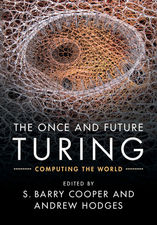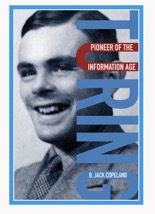This page will be devoted to Alan Turing with excerpts from various books and additional references. Click here for the original On Computable Numbers paper he wrote which started all of this.
Please send other books you would like to see added.
 “This is the cue for a large section on learning machines, with constructive arguments for how machines might do apparently unmechanical things for which explicit programs are unknown: the first public exposition of what I have called his 1941 vision. Turing advocates two different approaches – in modern parlance top-down and bottom-up – which in fact derive from his 1936 descriptions of the machine model. Explicit instruction notes become explicit programming; implicit states of mind become the states of machines attained by learning and self-organizing.” Turing added,
“This is the cue for a large section on learning machines, with constructive arguments for how machines might do apparently unmechanical things for which explicit programs are unknown: the first public exposition of what I have called his 1941 vision. Turing advocates two different approaches – in modern parlance top-down and bottom-up – which in fact derive from his 1936 descriptions of the machine model. Explicit instruction notes become explicit programming; implicit states of mind become the states of machines attained by learning and self-organizing.” Turing added,
 “I doubt whether there will ever be a time when people suddenly say “artificial intelligence has been achieved”. Rather, the gradual symbiosis of computers with us humans will continue. More and more functions that were once performed by humans will be taken on by computers, which will become better and better at reflecting and responding to our detailed human experiences. More and more of our lives and activities will be played out as computations, and at some level the human condition will be reduced to a matter of abstract computation.”
“I doubt whether there will ever be a time when people suddenly say “artificial intelligence has been achieved”. Rather, the gradual symbiosis of computers with us humans will continue. More and more functions that were once performed by humans will be taken on by computers, which will become better and better at reflecting and responding to our detailed human experiences. More and more of our lives and activities will be played out as computations, and at some level the human condition will be reduced to a matter of abstract computation.”
One might have thought that, as one makes the rules for a system more and more complicated, its behavior must become correspondingly more complicated. But the remarkable thing that one observes in the computational universe – and that the Principle of Computational Equivalence implies – is that it does not. Instead, as soon as one is above a very low threshold, the complexity of the behavior one sees is in effect quite independent of the complexity of the underlying rules.”
 “Maybe Turing had been bitten so deeply by the machine bug that he had never even bothered to turn up to Newman’s subsequent lectures on Gödel. Or perhaps it was an example of what Newman later called, rather snippily, ‘a defect of his qualities’, namely that ‘he found it hard to use the work of others, preferring to work things out for himself’.9 Gödel certainly had no such defect, and was unstinting in his praise for what Turing achieved during his year of deep thought.”
“Maybe Turing had been bitten so deeply by the machine bug that he had never even bothered to turn up to Newman’s subsequent lectures on Gödel. Or perhaps it was an example of what Newman later called, rather snippily, ‘a defect of his qualities’, namely that ‘he found it hard to use the work of others, preferring to work things out for himself’.9 Gödel certainly had no such defect, and was unstinting in his praise for what Turing achieved during his year of deep thought.”
